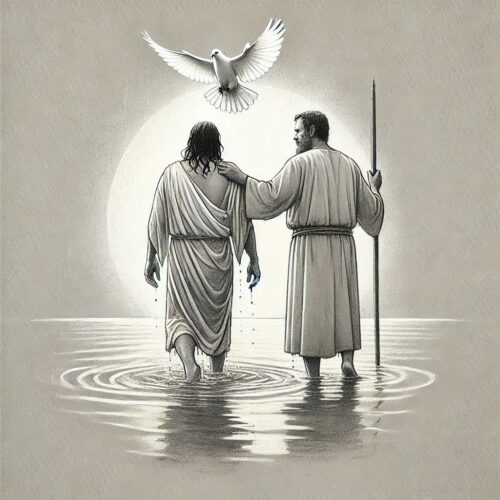Why Did Jesus Insist on Being Baptised? Five Biblical Reasons
In Matthew’s Gospel, we encounter a fascinating moment that never fails to puzzle us. John the Baptist, seeing Jesus approaching the Jordan River for baptism, seeks to prevent Him. “I need to be baptised by you,” John protests, “and do you come to me?” (Matthew 3:14). It’s a reasonable objection. After all, John’s was a baptism of repentance for the forgiveness of sins. Why would Jesus, the sinless Son of God, insist on such a baptism?
Jesus’ response is both firm and profound: “Let it be so now, for thus it is fitting for us to fulfil all righteousness” (Matthew 3:15). His insistence on baptism, far from being a mere formality, carries deep theological significance that illuminates the very nature of His mission and ministry. Let’s explore five biblical reasons why Jesus insisted on being baptised:
1. TO FULFIL ALL RIGHTEOUSNESS
Jesus’ own words provide our first and most direct reason. But what did He mean by “fulfilling all righteousness”? In the Reformed tradition, the statement is seen to carry profound significance. John Calvin, in his Commentary on Matthew, suggests Christ submitted to baptism not because He needed cleansing, but because He was fulfilling the righteous requirements of the law on our behalf.
Think of Jesus’ work of salvation as having two parts. First, He took our punishment by dying on the cross for our sins—theologians call this His “passive obedience” because He submitted to death for us. But there’s a second part we sometimes overlook: throughout His life, Jesus perfectly obeyed every single one of God’s commands—this is what we call His “active obedience.”
Why does this matter? Because God requires both the payment for our sins AND perfect obedience to His law. We need both our sins forgiven AND a record of perfect obedience to be right with God. The wonderful news is: Jesus provides both! When we trust in Christ, not only are our sins forgiven through His death, but His perfect life of obedience is credited to our account. It’s as if God looks at us and sees Jesus’ perfect record instead of our failures.
This is where Jesus’ baptism fits in. Though He didn’t need to be baptised for His own sake, He did it as part of His perfect obedience to God. It was one more way He was fulfilling God’s will completely. The Bible calls Jesus the “last Adam” because, unlike the first Adam who failed to obey God, Jesus succeeded in every way. As our representative (and Federal Head), His perfect obedience becomes the basis for God declaring us righteous when we trust in Him.
2. TO BE PUBLICLY INAUGURATED INTO HIS MINISTRY
The moment of Jesus’ baptism served as His public inauguration into ministry, following the pattern established in the Old Testament for priests and prophets. When priests were consecrated for service, they were washed with water (Exodus 29:4-7). Jesus’ baptism similarly marked the official beginning of His public ministry, but with an unprecedented divine endorsement.
This inauguration was confirmed by the dramatic scene that followed: “And when Jesus was baptised, immediately he went up from the water, and behold, the heavens were opened to him, and he saw the Spirit of God descending like a dove and coming to rest on him; and behold, a voice from heaven said, ‘This is my beloved Son, with whom I am well pleased'” (Matthew 3:16-17). Here we see all three persons of the Trinity involved in this momentous occasion—the Father speaking, the Spirit descending, and the Son being baptised.
3. TO IDENTIFY FULLY WITH HIS PEOPLE
Perhaps one of the most moving reasons for Jesus’ baptism was His desire to identify completely with those He came to save. As Thomas Goodwin, the Puritan divine, observed, Christ’s baptism represented His wholehearted identification with sinners, though He Himself knew no sin.
This identification points forward to the doctrine of union with Christ, so central to Reformed theology. Just as Christ identified with us in baptism, so we’re united with Him in His death and resurrection through our own baptism, as Paul explains in Romans 6:3-4: “Do you not know that all of us who have been baptised into Christ Jesus were baptised into his death? We were buried therefore with him by baptism into death, in order that, just as Christ was raised from the dead by the glory of the Father, we too might walk in newness of life.”
This profound identification establishes a pattern that characterises Jesus’ entire earthly ministry—the sinless One taking His place among sinners, the Shepherd gathering His sheep, the Head uniting Himself to His body, the Church.
4. TO FORESHADOW HIS DEATH AND RESURRECTION
Later in His ministry, Jesus would speak of another baptism He had to undergo: “I have a baptism to be baptised with, and how great is my distress until it is accomplished!” (Luke 12:50). Here, Jesus was referring to His coming death. His baptism in the Jordan River thus served as a prophetic dramatisation of His future death, burial, and resurrection.
Jonathan Edwards powerfully expounds on this connection, noting Christ’s immersion in the waters prefigured His being swallowed up in death, while His emergence foreshadowed His victorious resurrection. This understanding adds deeper meaning to Paul’s words in Colossians 2:12, where he connects our baptism with being “buried with him in baptism, in which you were also raised with him through faith in the powerful working of God, who raised him from the dead.”
5. TO ESTABLISH THE PATTERN FOR CHRISTIAN BAPTISM
Finally, Jesus’ baptism established the pattern for the sacrament of Christian baptism. Before ascending to heaven, Jesus commanded His disciples to “go therefore and make disciples of all nations, baptising them in the name of the Father and of the Son and of the Holy Spirit” (Matthew 28:19). His own baptism provided both the example and the foundation for this sacrament.
Francis Turretin, the renowned Reformed systematician, explains Christ’s baptism sanctified the waters of baptism for all His followers—once and for all. While our baptism differs from His in that we need cleansing from sin while He did not, the basic pattern remains the same: identification with Christ, initiation into God’s covenant community, and symbolic representation of spiritual realities.
CONCLUSION
Jesus’ insistence on being baptised, then, is far from being a puzzling anomaly. It reveals the beautiful wisdom of God’s plan of redemption. His baptism simultaneously fulfilled God’s righteous requirements, inaugurated His public ministry, identified Him with His people, prefigured His saving work, and established the pattern for Christian baptism throughout the ages.
Understanding these reasons deepens our appreciation for Christ’s work on our behalf and enriches our understanding of our own baptism. As we reflect on Christ’s baptism, we’re reminded that every step of His earthly journey was purposeful, including this moment when He humbled Himself to be baptised by John.
The one who had no sin took His place among sinners, not because He needed cleansing, but because we did. In this, as in all things, He proved Himself to be the perfect Saviour, worthy of our trust, worship, and complete devotion.
WHY DID JESUS INSIST ON BEING BAPTISED?—RELATED FAQs
Did Jesus’ baptism change His divine nature in any way? No, Jesus’ baptism did not alter His divine nature or add to His perfection. Rather, it was an act of condescension where the eternal Son took upon Himself the requirements of the covenant while remaining fully God and fully man. The baptism was for our sake, not because Jesus needed any change or improvement in His person.
- How does Jesus’ baptism relate to the doctrine of election? Jesus’ baptism marked Him publicly as the chosen Messiah, foreshadowing His role in securing the salvation of God’s elect. Just as He was marked out by the Father’s voice and the Spirit’s descent, His baptism points to the certainty of His work in saving all whom the Father has given Him.
- Why was John initially reluctant to baptise Jesus? John recognised Jesus’ sinless nature and superior position as the Messiah, making him feel unworthy to perform the baptism. His reluctance demonstrates both the extraordinary nature of Jesus’ humility in submitting to baptism and the proper response of reverence before Christ’s majesty.
Does the mode of Jesus’ baptism (immersion, sprinkling, or pouring) set a binding pattern for Christian baptism today? While Scripture records Jesus coming up “out of the water,” Reformed theology has historically maintained the mode of baptism isn’t the essential element—it’s the spiritual reality being signified that matters. The Westminster Confession affirms dipping of the person into the water isn’t necessary, and that baptism is rightly administered by pouring or sprinkling water upon the person. The focus should be on what baptism signifies—our union with Christ, cleansing from sin, and incorporation into God’s covenant.
- How does Jesus’ baptism relate to the doctrine of election? Jesus’ baptism marked Him publicly as the chosen Messiah, foreshadowing His role in securing the salvation of God’s elect. Just as He was marked out by the Father’s voice and the Spirit’s descent, His baptism points to the certainty of His work in saving all whom the Father has given Him.
- Why was John initially reluctant to baptise Jesus? John recognised Jesus’ sinless nature and superior position as the Messiah, making him feel unworthy to perform the baptism. His reluctance demonstrates both the extraordinary nature of Jesus’ humility in submitting to baptism and the proper response of reverence before Christ’s majesty.
Does the mode of Jesus’ baptism (immersion, sprinkling, or pouring) set a binding pattern for Christian baptism today? While Scripture records Jesus coming up “out of the water,” Reformed theology has historically maintained the mode of baptism isn’t the essential element—it’s the spiritual reality being signified that matters. The Westminster Confession affirms dipping of the person into the water isn’t necessary, and that baptism may be administered by poring or sprinkling water. The focus should be on what baptism signifies—our union with Christ, cleansing from sin, and incorporation into God’s covenant community.
- How does Jesus’ baptism relate to the Old Testament washings and purification rites? Jesus’ baptism fulfilled and transformed the Old Testament ceremonial washings, showing their ultimate purpose in pointing to Christ. His baptism served as a transition point between the Old and New Covenant forms of ritual purification, demonstrating both continuity and transformation in God’s covenant dealings.
- Was Jesus’ baptism a model for trinitarian doctrine? The baptismal scene provides one of Scripture’s clearest demonstrations of trinitarian truth, with the Father speaking, the Spirit descending, and the Son being baptised. This event strongly supports the Reformed emphasis on the distinct persons yet united nature of the Trinity in accomplishing salvation.
How should Jesus’ baptism influence our view of our own baptism? Our baptism should be understood as a sign and seal of our union with Christ, including union with Him in His death and resurrection. While Christ’s baptism was unique in fulfilling all righteousness, our baptism represents our incorporation into His accomplished work and our participation in the covenant community.
WHY DID JESUS INSIST ON BEING BAPTISED?—OUR RELATED POSTS
Editor's Pick

From Empty to Overflow: The Abundant Life Jesus Promised
(AND WHY YOU SHOULDN’T SETTLE FOR LESS) We're surviving, but are we thriving? If we're honest, there's a gap between [...]

What Does Jesus Save Us From?
THREE BIBLE TRUTHS ABOUT SALVATION "Jesus saves." We’ve seen it on bumper stickers, heard it shouted at sporting events, maybe [...]

If God Wants Everyone Saved, Why Aren’t They?
THE REFORMED VIEW ON GOD’S DESIRE VS HIS DECREE The question haunts every believer who has lost an unbelieving loved [...]

The One Man Mystery in Acts 17:26: Is It Adam Or Noah?
When the Apostle Paul stood before the philosophers at Mars Hill, he delivered an insightful statement about human unity: “And [...]

Megiddo Or Jerusalem: Where Did King Josiah Die?
Recent archaeological discoveries at Tel Megiddo continue to reveal evidence of Egyptian military presence during the late 7th century BC, [...]

Losing Your Life Vs Wasting It: How Are the Two Different?
AND WHY DID JESUS PRAISE THE FORMER? Jesus spoke one of the most perplexing statements in Scripture: “For whoever wants [...]

Can Christians Be Demon Possessed? What the Bible Teaches
Perhaps you’ve witnessed disturbing behavior in a professing Christian, or you’ve struggled with persistent sin and wondered if something darker [...]

Sacred Fury: What Christ’s Temple Cleansing Truly Means
Mark 11 records the crack of a handmade whip that echoed through the temple corridors. Tables crashed to the ground, [...]

Did Jesus Cleanse the Temple Twice?
OR DID JOHN DISAGREE WITH THE SYNOPTICS ON TIMING? One of sceptics’ favourite "gotcha" questions targets what they see as [...]

Self-Authentication: Why Scripture Doesn’t Need External Validation
"How can the Bible prove itself? Isn't that circular reasoning?" This objection echoes through university classrooms, coffee shop discussions, and [...]
SUPPORT US:
Feel the Holy Spirit's gentle nudge to partner with us?
Donate Online:
Account Name: TRUTHS TO DIE FOR FOUNDATION
Account Number: 10243565459
Bank IFSC: IDFB0043391
Bank Name: IDFC FIRST BANK






